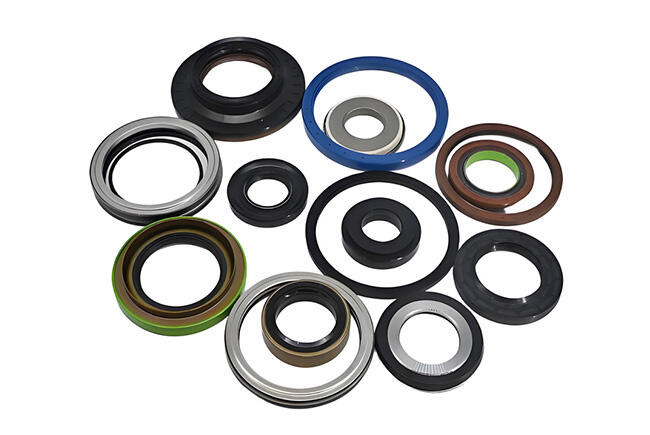When people talk about forklifts, most think about lifting capacity or battery life—but rarely about the tiny seals inside. Yet, anyone who has spent years in maintenance knows that these small components often dictate how reliably a forklift will perform over time. Honestly, I’ve lost count of the times I’ve opened a hydraulic cylinder or a steering assembly only to realize a tiny seal was causing a major headache.
Forklifts are surprisingly complex in terms of sealing. They have multiple hydraulic cylinders, steering units, transmissions, engines, and auxiliary systems, each requiring its own sealing solution. The key series we usually deal with are O-rings, oil seals, rod and piston seals, wipers, and composite gaskets. Each serves a different function, but together they make sure the forklift keeps moving safely and efficiently.
O-Rings – Small but Critical
O-rings are everywhere: valve connections, pump housings, pipe joints—you name it. Most standard forklifts use NBR (nitrile rubber), which handles mineral oil well. In higher temperature applications, FKM (fluoroelastomer) is preferred, especially for LPG or diesel engines where oil temperatures spike. People sometimes underestimate O-rings because they are cheap, but let me tell you—one failed ring can shut down a whole truck and cause unplanned maintenance for days.
Hydraulic Cylinder Sealing Sets
The mast and tilt cylinders are the “heart” of the forklift. Their sealing sets are more than just a single ring: piston seals maintain internal pressure, rod seals prevent leakage as the rod moves, and wipers keep dust and dirt out. Materials vary depending on load and environment—polyurethane is common for wipers, PTFE blends for piston seals to reduce friction under high pressure. I remember a site in a port warehouse where a customer’s mast was jerky—the culprit was a poorly chosen rod seal, not the cylinder itself. That experience stuck with me: selecting the right material is often more important than the part brand.
Transmission and Axle Seals
Electric forklifts have different shaft seals than diesel models, but both rely on reliable oil seals to retain lubricants and block contaminants. High-load applications often use FKM or HNBR materials, sometimes with integrated dust lips for outdoor or dirty environments. One thing I often mention to dealers: don’t skimp on these seals. The cost savings on cheap materials rarely outweighs the maintenance headache.
Steering System Seals
Steering cylinders see constant motion. Pressure is lower than mast cylinders, but the wear is continuous. Compact sealing sets combining rod seals and wipers are essential. Many fleet operators find steering leaks early on because standard seals weren’t chosen for continuous dynamic stress. My advice? Evaluate the entire motion profile, not just pressure.

Why Quality Matters for Dealers and Fleet Operators
I often get questions from distributors: “Why does a tiny seal cause so much downtime?” The answer is simple. Leaks are safety hazards, create messy maintenance issues, and immobilize machines. For businesses running dozens of forklifts, even a single unit down disrupts logistics.
This is why companies like NQKSF focus not just on parts, but on uptime support.
Immediate Supply of Standard Parts: Over 10,000 SKUs in stock, including O-rings, oil seals, and hydraulic seal kits. Dealers can dispatch urgent orders the same day.
Customized Engineering Services: From material selection to design adjustments and testing, NQKSF ensures seals fit the exact working conditions of each forklift model.
Technical Empowerment: With 30+ years in sealing technology, NQKSF advises clients on optimizing sealing systems, reducing maintenance costs, and improving reliability.
Company Highlights
· NQKSF isn’t just a supplier—they’re a manufacturing partner:
· Physical plant ensures production quality and delivery times.
· Full range of stock, covering standard and most common non-standard sizes.
· Exports to 80+ countries, trusted by global brands.
· Provincial Technology Innovation Center & High-Tech Enterprise certification.
· Recognized leader in regional sealing industry clusters.
FAQ
Q: How often should forklift seals be replaced?
A: It depends on material, environment, and usage. NBR can last years in normal warehouse conditions, but in high-heat or aggressive oil scenarios, FKM is safer.
Q: Can one supplier cover all forklift models?
A: That’s where NQKSF shines. From common Japanese and European forklifts to customized Chinese models, sealing kits are stocked and ready.
Q: Are generic seals as good as OEM parts?
A: Only if dimensions, materials, and designs match. Quality control and experience matter far more than brand alone.
Forklift seals are also used in excavators, industrial robots, wind turbines, and agricultural machinery. This cross-industry relevance is why distributors often stock sealing products—they serve multiple sectors with fewer SKUs.
In short, a forklift relies on a handful of seal series: O-rings, hydraulic cylinder kits, shaft oil seals, and steering seals. Tiny parts, yes, but they define machine reliability. For distributors, workshops, and fleet operators, working with NQKSF means fast access to parts and expert guidance—ensuring the seals perform as intended and the forklifts keep moving without unplanned stops.
 Hot News
Hot News